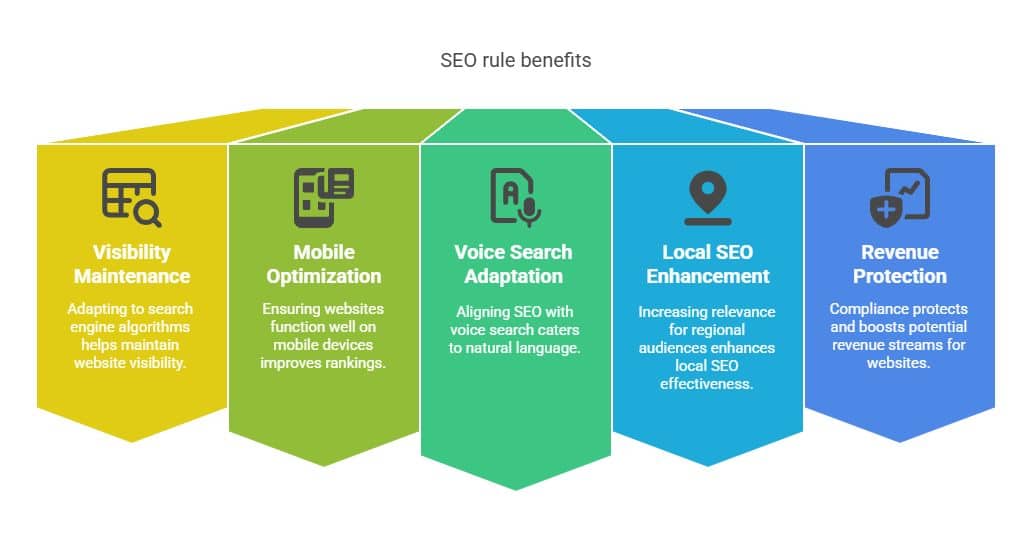
Why Are New Search Engine Rules Crucial for SEO?
New search engine rules are crucial for SEO as they direct websites to prioritize user experience, ensuring mobile optimization and personalized content. Quickly adjusting to algorithm updates allows you to stay ahead of the competition. Embrace mobile-first indexing and optimize for voice search. Keeping up with these guidelines increases natural website visits. It also protects potential income by improving how visible and relevant your content appears. Businesses that align their strategies with new search engine rules benefit from increased engagement and higher conversion rates. Understanding these changes can position a business to harness the full potential of SEO innovations for continued success.
Key Takeaways
- New rules help maintain website visibility by adapting to evolving search engine algorithms.
- They make sure websites work well on mobile devices. This is important for maintaining good search engine rankings.
- Adjusting to voice search trends aligns SEO with natural language processing needs.
- New rules enhance local SEO effectiveness, increasing relevance for regional audiences.
- Complying with updated rules protects and boosts potential revenue streams.

Enhancing User Experience
In today’s digital landscape, enhancing user experience is paramount for successful SEO strategies. Search engines now focus more on user experience. Businesses need to take a broad approach to attract and keep their audience engaged. Central to this endeavor is the implementation of mobile optimization strategies.
Many people use their phones to browse websites. It’s important that websites work well on different screen sizes. This not only improves page load speed but also enhances user engagement metrics, as visitors are more likely to stay on a site that is easy to navigate on their mobile devices.
Content personalization techniques further augment user experience by tailoring information to meet individual preferences and behaviors. By leveraging data analytics, businesses can deliver relevant content that resonates with users, fostering deeper connections and boosting engagement. This personalized approach is essential in a competitive digital environment where users expect experiences that cater to their unique needs and interests.
Additionally, website accessibility improvements play a crucial role in enhancing user experience. By adhering to accessibility standards, businesses ensure that their websites are usable by individuals with diverse abilities, thereby expanding their audience reach.
Features such as alt text for images, keyboard navigation, and screen reader compatibility contribute to an inclusive digital environment, aligning with ethical standards and legal requirements.
Ultimately, focusing on these aspects of user experience not only aligns with evolving search engine criteria but also positions businesses to thrive in a dynamic digital market. Companies can gain long-term SEO success by focusing on user satisfaction. This involves optimizing for mobile devices personalizing content, and ensuring accessibility.
Adapting to Algorithm Changes
Navigating the ever-evolving landscape of search engine algorithms requires businesses to remain agile and informed. As search engines refine their algorithms, understanding and adapting to these changes is crucial for maintaining visibility and relevance in search results. Embracing updated keyword optimization strategies is essential for aligning with new search patterns and user intent, ensuring that content remains discoverable.
To assist in visualizing the impact of these changes, consider the following table:
| Algorithm Change | Emotional Impact |
| Mobile First Indexing | Anxiety about mobile compatibility |
| Voice Search Trends | Excitement for new opportunities |
| Local SEO Tactics | Urgency to optimize local presence |
| Content Quality Assessment | Pressure to enhance content value |
Mobile first indexing emphasizes the need for businesses to optimize their websites for mobile devices, as search engines predominantly use mobile versions of content for indexing and ranking. This shift can induce anxiety, but it also presents an opportunity to capture a growing audience of mobile users.
Voice search trends are reshaping keyword optimization strategies, encouraging businesses to focus on natural language and conversational phrases. The rise of voice-activated devices opens exciting new avenues for reaching customers, demanding a rethinking of traditional SEO approaches.
Local SEO tactics have gained prominence, especially for businesses targeting regional audiences. Implementing these strategies can evoke a sense of urgency as companies strive to enhance their local presence and improve search engine rankings.
Maintaining Competitive Edge

Achieving a competitive edge in the dynamic realm of SEO demands an unwavering commitment to innovation and strategic foresight. As search engines continuously evolve, businesses must refine their approaches to ensure visibility and relevance. A robust keyword strategy is paramount, focusing not just on popular terms, but also long-tail keywords that can capture niche market segments. This nuanced approach enhances content relevance, allowing businesses to address the specific needs and queries of their target audience, thereby increasing engagement and retention.
In addition to a well-crafted keyword strategy, backlink quality remains a cornerstone of competitive SEO. High-quality backlinks from authoritative and relevant sites enhance credibility and can significantly influence search rankings. It is vital to cultivate relationships with reputable websites and employ ethical link-building practices to maintain a strong backlink profile.
Equally important is mobile optimization. With mobile devices accounting for an ever-increasing share of web traffic, ensuring that websites are mobile-friendly is no longer optional; it is essential. Responsive design and fast loading times are critical factors that enhance user experience and contribute to higher search rankings.
Local SEO strategies are also crucial in maintaining a competitive edge, particularly for businesses with physical locations. Optimizing for local search involves claiming and updating Google My Business listings, gathering local reviews, and employing location-specific keywords.
This approach ensures that businesses appear prominently in local search results, driving foot traffic and local engagement.
Boosting Organic Traffic

Increasing organic traffic stands as a fundamental objective for businesses seeking to enhance their online presence and achieve sustainable growth. The implementation of effective keyword optimization strategies is crucial, as it enables search engines to better understand and rank content, thereby improving visibility.
By conducting thorough keyword research, businesses can identify high-value terms that align with user intent, ensuring that their content meets the demands of their target audience.
Equally important is the content relevance importance. High-quality, relevant content not only keeps visitors engaged but also signals to search engines that a website is a trusted source of information. This relevance is amplified through regular updates and the inclusion of evergreen content, which maintains its value over time.
Social media integration plays a pivotal role in boosting organic traffic. By leveraging social platforms, businesses can distribute content more widely, reaching potential customers who may not have encountered it through traditional search engine results. This not only increases brand exposure but also drives traffic back to the website, enhancing its search engine rankings.
Another critical component is local search tactics, which cater to businesses targeting specific geographical areas. By optimizing for local SEO through location-specific keywords and Google My Business listings, companies can attract nearby customers, thereby increasing foot traffic and online interactions.
Safeguarding Revenue Potential

Ensuring the security of revenue streams is paramount for businesses aiming to maintain financial stability and foster long-term success. As search engine rules evolve, companies must adapt their revenue strategies to safeguard and enhance their financial potential.
One critical aspect of this adaptation is content monetization, which requires a strategic approach to leverage valuable content effectively. By aligning content with audience interests, businesses can create opportunities for monetization through advertisements, sponsorships, or direct sales.
To optimize conversion rates, businesses must employ advanced analytics tracking. This involves the systematic collection and analysis of data related to user behavior, enabling companies to refine their approaches and make informed decisions.
By understanding how users interact with a website, businesses can fine-tune their conversion optimization efforts. This might include adjusting landing pages, streamlining purchase processes, or enhancing call-to-action elements to ensure users are guided seamlessly toward desired outcomes.
Furthermore, effective audience targeting is essential for maximizing revenue potential. By identifying and segmenting audiences based on demographics, interests, and behaviors, businesses can tailor their marketing efforts to reach the most receptive segments.
This not only improves the efficiency of marketing campaigns but also enhances the likelihood of conversion, thereby boosting revenue.
Final Thoughts
Adapting to new search engine rules is essential for maintaining a competitive edge and achieving sustainable growth. By focusing on user experience, mobile optimization, and personalized content, businesses can align their strategies with evolving algorithm criteria. Embracing local SEO, voice search readiness, and structured data implementation further boosts visibility and relevance. Incorporating high-quality backlinks and refining keyword strategies enhances credibility and search performance. Regular performance monitoring ensures that adjustments are made in line with updates, safeguarding revenue potential and driving long-term success in an ever-changing digital landscape.
Looking to stay ahead of search engine updates and boost your website’s performance? Connect with Syville Gacutan, an SEO Specialist in the Philippines. Gain expert insights, tailored strategies, and hands-on support to ensure your website thrives in the ever-evolving digital landscape. Let’s achieve sustainable growth together—reach out today!